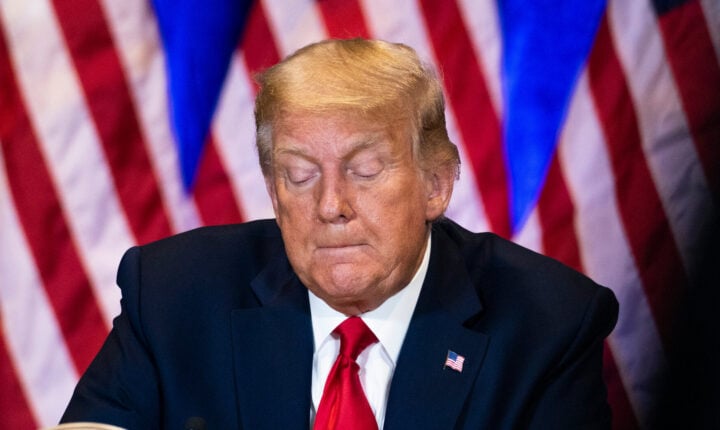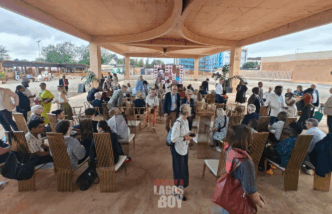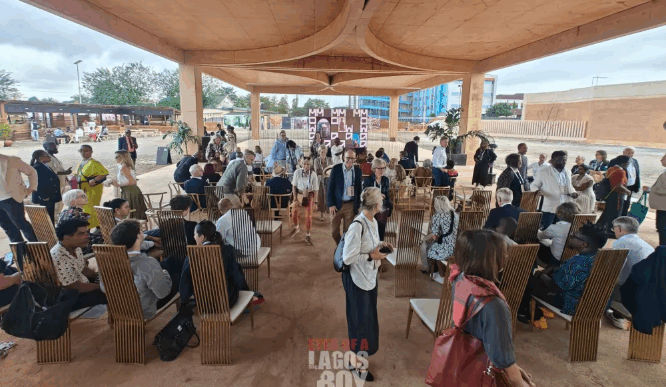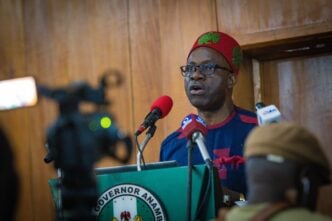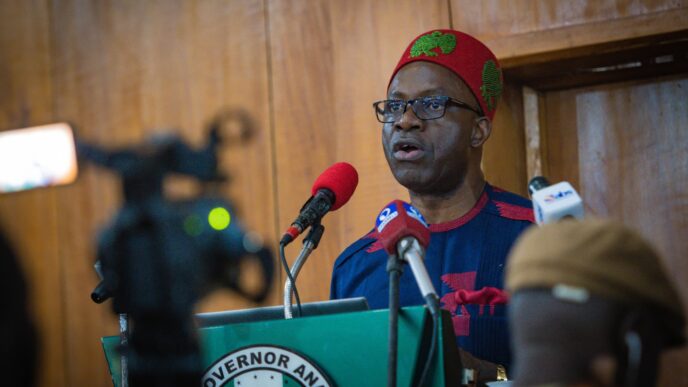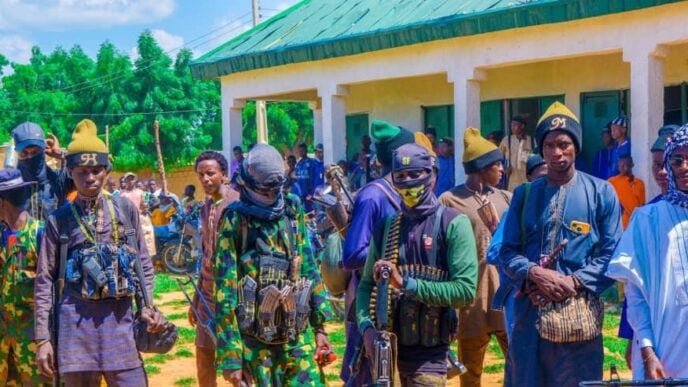Donald Trump
BY GBENGA AYINDE
In July 2025, while markets reeled from a war of words between Donald Trump and Elon Musk, the spectacle revealed something far larger than the clash of two billionaires. After Trump threatened to strip federal subsidies from Musk’s companies for opposing a congressional spending bill, Tesla’s shares tumbled and Musk’s net worth shrank by an astonishing $12 billion in a single day. The feud, a self-inflicted economic sabotage that reminded the world that political tantrums can still shake Wall Street.
Yet the episode also underscored how little sway such bluster now holds beyond America’s borders. For years, Trump’s social-media outbursts rattled currencies, from the Turkish lira to emerging-market bonds, where a single tweet about tariffs or sanctions could erase billions overnight. But when similar threats and rhetoric targeted Nigeria, the reaction was strikingly different. The world’s most populous Black nation did not flinch; its currency recovered, its bonds sold out, its alliances deepened.
The difference tells the story. Trump’s obtuse and caustic rhetoric, framed around “defending persecuted Christians,” is a convenient mask for something else: a disingenuous geopolitical bluff meant to discipline Nigeria for its growing independence from Western control.
Advertisement
The real strategic affronts beneath the noise lie in a series of deliberate Nigerian moves that Washington and its allies cannot easily ignore.
One, Nigeria’s deepening participation in China’s Belt and Road Initiative (BRI) represents a strategic pivot away from Western tutelage. Every new rail, port, and digital-infrastructure project under BRI shrinks Western contractors’ grip and cedes influence to Beijing in Africa’s largest economy.
Two, through the Pan-African Payment and Settlement System (PAPSS), championed by Afreximbank in Abuja, Nigeria, is helping to build the financial plumbing for intra-African trade that bypasses SWIFT. PAPSS allows direct local-currency settlements, weakening the supremacy of the US dollar and the Euro in continental commerce. It is, in essence, the decolonisation of African trade.
Advertisement
Three, with massive private refineries like Dangote’s coming online, Nigeria no longer depends on imported refined fuels. The country is set to become a net exporter of petrol and diesel, creating potential stranded assets for European refiners once fed by Nigerian crude. The profit flow is reversing, and Western traders are on the losing side.
Lastly, a resource lockout portended by partnerships with Eastern-bloc nations on rare-earth extraction and value-addition ensures that Nigeria’s strategic minerals feed non-Western supply chains is imminent. These deals underpin everything from EV batteries to advanced semiconductors, which are the drivers of twenty-first-century power. Leaving “little or nothing on the table for the West” is not oversight; it’s design.
Seen through this prism, Trump’s latest rhetorical barrage is not random noise but the modern face of coercive diplomacy. The goal is to weaponise words to produce panic: drive investors out, weaken the naira, and push Abuja to “rethink” its Eastern alignments.
But the bluff has failed spectacularly. Nigeria’s $2.35 billion Eurobond attracted a $13 billion order book: a massive oversubscription that signals investor confidence rather than fear. The naira rebounded after an initial dip, erasing any notion of crisis. Chinese capital has poured in faster than before; lithium-processing projects worth over $1 billion are moving ahead. PAPSS continues to expand across the continent, its credibility strengthened precisely because Western hostility validates its necessity.
Advertisement
Trump’s fiery tweets might rattle the Turkish lira or shave billions off Musk’s fortune, but they could not shake Abuja. The markets have called his bluff.
What we are witnessing is a confrontation between two worldviews.
The old paradigm insists that Africa’s wealth must circulate through Western systems: raw materials out, refined goods back in, payments cleared in London or New York, and policy obedience purchased with foreign aid.
The new Nigerian paradigm seeks energy autonomy, financial sovereignty, and multi-aligned diplomacy. In this framework, partnership replaces patronage, and competence, not compliance, defines legitimacy. The tension, therefore, is not religious or rhetorical but systemic: the fading unipolar order colliding with an emerging multipolar reality.
Advertisement
The handwriting on the wall is this: Trump’s bluff has been exposed for what it is, a performance of a power in decline. Nigeria’s steadiness amid the storm shows that coercion has lost its sting. Markets no longer quake at the sound of American fury; they read the fundamentals, not the tweets.
For the self-styled dealmaker, the message is biblical and unmistakable. The handwriting is already on the wall: Mene, Mene, Tekel, Perez (numbered, weighed, divided). The empire’s days of unchallenged dominance are counted; its moral weight has been measured and found wanting; its spoils are being shared among new actors bold enough to claim their share. The currency of intimidation no longer buys obedience. What remains is the echo of an old order trembling before the dawn of the new.
Advertisement
The inscription that ended Babylon’s feast did more than judge a king; it marked the twilight of an age that mistook control for destiny. Today, that same handwriting scars the hallways of the global order, a warning to the overlords in Western finance capitals and in their crumbling temples of moral superiority. Mene Mene Tekel Perez: numbered, weighed, divided.
For decades, Africa’s journey toward sovereignty has been violently interrupted. The West silenced those who saw too clearly and dated to dream too freely: Patrice Lumumba, who envisioned economic independence as the true meaning of freedom; Thomas Sankara, who sought to make dignity a national currency; Samora Machel, who labored to build solidarity from the ruins of colonialism; and Muammar Gaddafi, whose audacious Pan-African project threatened to unite the continent’s wealth against Western extraction. One by one, they fell, victims of coups, conspiracies, and covert wars that kept Africa’s destiny mortgaged to external powers.
Advertisement
But history has turned again. The rebellion, once crushed by guns, is re-emerging through industry, algorithms, logistics, and trade routes. This is not the Africa of protest, but of quiet power; not a continent begging for justice, but one designing its own economy of freedom.
Mene Mene Tekel Perez no longer tolls for ancient Babylon; it tolls for every empire that mistook control for destiny. The Western order, once unchallenged, now watches its instruments of dominance: currency, influence, and narrative, lose their magic. The bluff has been called; the hierarchy inverted.
Advertisement
Nigeria’s defiance is not rebellion; it is restoration. It completes a circle broken by assassination and interference, reclaiming the right to determine Africa’s value and voice. On the cracked wall of the old order, the handwriting shimmers again: the empire has been weighed and found wanting, its season is numbered, and the inheritance is being divided among those who dare to read (and believe) the signs.
Ayinde can be contacted via [email protected]
Views expressed by contributors are strictly personal and not of TheCable.
